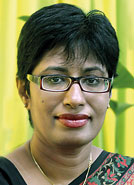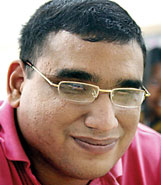What started off as a single person’s venture, reading Robert Knox’s “An Historical Relation of the Island Ceylon” to a blind history student, now involves the whole staff as well as some senior students from the Department of International Relations of the University of Colombo. A “direct result” of the reading programme, says Prof. Nayani Melegoda, professor in International Relations at the University of Colombo, has been the selection of Ishan Jalill who is visually impaired into the Special Degree programme in International Relations in the year 2010/2011.
 |
| Prof. Nayani Melegoda |
“Reading was a big thing in my family,” Prof. Melegoda, begins her story, describing how when she and her three younger siblings were children, presents always came in the form of books. “It is a major part of my life, so when I see someone who cannot read, I have to do something. I can’t imagine how one could live without reading.” And so the inspiration for beautiful work was born in childhood.
Her love of reading was then coupled with a unique experience in Year 10 at Vishaka Vidyalaya. Mrs. Rohini Umagiliya, an inspirational teacher whom Prof. Melegoda still keeps in touch with, initiated what was called the Braille Project. Thirty-five students including young Nayani were enrolled in a Braille course, where, on slates borrowed from the Council for the Blind in Sri Lanka, they learned to read and write the dot patterns.
They then translated popular novels into Braille at home and donated them to the Council – a gesture which led to the development of a longer voluntary project of recording academic texts onto audio tapes for the use of the visually impaired. “It was not an exam component or anything” Prof. Melegoda shares, “but it left a great impact on me.”
The spark lit by her childhood love of reading and encouraged by the innovative ventures of her secondary teacher, was not fully kindled until Nayani Melegoda, fresh graduate, went overseas for her post-graduate studies. “There were not many blind students when I was an undergraduate here,” she explains, sitting in her neatly organised office at the University of Colombo, “but I noticed that abroad, better facilities allowed visually impaired students to compete at the same level as the others.” Thus when she later joined the University of Colombo as a lecturer, she immediately brought forth her brain-child: the reading programme.
In her position as Secretary of the Alumni Association of the University of Colombo in 2007, Prof. Melegoda restarted the ‘Friend and Guide Host Family’ mentor programme to help visually impaired students from rural areas adjust to their new environment. Each student (there were 27 at the time) was assigned to a host family which took on the responsibility of visiting them and providing them with a homely social/psychological environment until they completed their higher education and found employment. “Some families even went as far as to provide medical care for these students,” Prof. Melegoda enthuses.
In 2008, the Sri Lanka Eye Foundation gave Prof. Melegoda the opportunity to address an international forum, where she discussed the obstacles and pathways in undergraduate education for the visually impaired. What she brought to the attention of the forum was “the small things that make a difference – good quality white canes, small recorders that aren’t heavy and difficult to carry around”.
Immediately after, leading eye surgeon Dr. Reggie Seimon offered his help and made a large number of micro-recorders available to the department. Mangala Edirisinghe Samarakoon from Albert Edirisinghe Opticians also offered assistance. The members of the Sri Lanka Federation of University Women have also been very supportive offering to make recordings of useful texts during their free time.
 |
| Ishan Jalill: Has got the chance
to dream big |
Prof. Melegoda recalls with a smile how in 2009, the students she had led her department in helping gave her their own special award, one she says is “very valuable” and of “equal value” to the prestigious Zonta Woman of Achievement award she won in the Social Change and Empowerment category less than a month ago.
Speaking of the students themselves, “they’re just normal kids”, she stresses. “They’ve got their girlfriends and their boyfriends” she smiles, adding that “they have got first classes, and they too get bucketed at the end of their final year!” The important thing for Prof. Melegoda is that these visually impaired and blind students can function normally even in their academic life.
“They are all evaluated the same,” she explains. “We don’t compromise on the depth of knowledge.” Thus the main aim behind her ventures is to give the students proper support to achieve the standards required by the faculty. To facilitate this, the students are also given special technology training – skills in the use of special mobile phone and computer software etc – under the guidance of IT trainer Asoka Weerawardena, seconded to the faculty by the Ministry of Social Services.
“The unimpaired students are very positive towards the handicapped,” she says describing how physically handicapped students with walking difficulties are often carried to their classrooms by their class-mates. “All our efforts are based purely on volunteer work,” she adds proudly, adding how staff and students from all ethnic and religious backgrounds help with the programme. “everyone wants to do something for their fellow human beings; be it for merit or human justice or whatever!”
Prof. Melegoda is no biased enthusiast though. “There’s so much that needs to be improved,” she says. “Our library and faculty are completely inaccessible to handicapped students,” she explains, adding that the absence of ramps as well as the texture and positioning of walls within the building are quite unfriendly to blind students as well as those with physical impairments. Her vision is to create awareness about these issues. “I strongly believe that education is the way to positive peace,” she says, adding that having awareness of others’ needs helps reduce conflict in homes and work spaces, and by extension, in the country at large.
Ishan Jalill, a past-pupil of S. Thomas College, who is a 2nd year student reading for an Honours Degree in International Relations at the University of Colombo, is proof that the visually impaired really have no academic disadvantage here. He elaborates on how his peers as well as his lecturers are very supportive. “Whenever there is a powerpoint presentation, the lecturer or a student will always explain to me what’s being projected on the screen,” he explains, adding that the reading programme has been key in helping him keep up with his classmates.
Prof. Melegoda’s efforts have helped him to dream big. Ishan is the only visually impaired person to be among 40 chosen for the Honours course out of nearly 200 applicants. |



